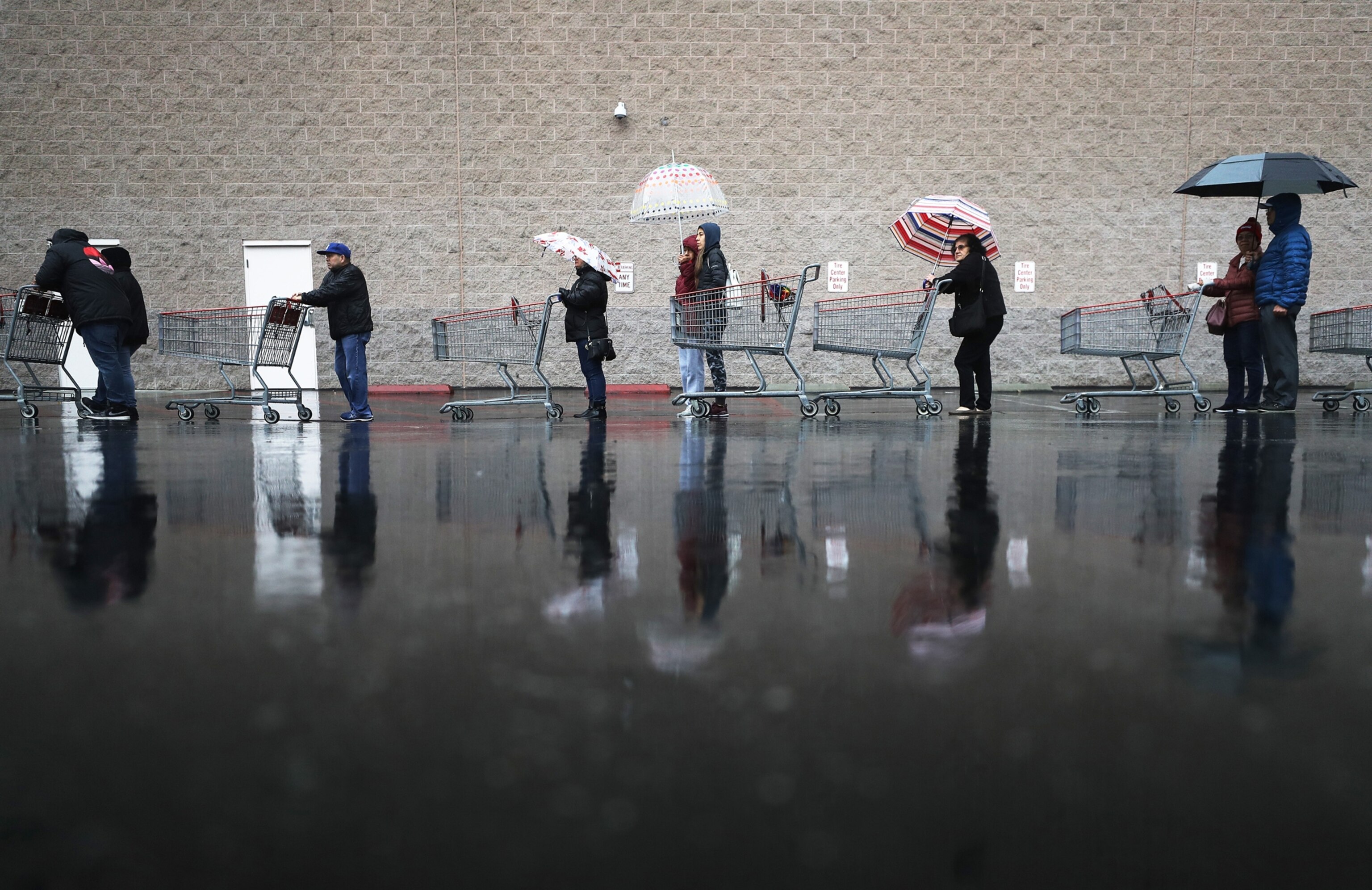
Coronavirus is spreading panic. Here’s the science behind why.
From prehistoric predator encounters to frantic toilet paper runs, our anxious brains can short-circuit when faced with the scary unknown.
Since the coronavirus began spreading across the world, we’ve learned a lot about the lengths to which people will go for a roll of toilet paper, a tube of hand sanitizer or a face mask. As the number of confirmed coronavirus cases increases and states and countries lock down large gatherings or shops to promote social distancing, these uncertainties are driving the so-called “panic-buying” that’s emptying store shelves quicker than they can be restocked.
Panic-buying supplies is one way humans have coped with uncertainty over epidemics since at least 1918 during the Spanish flu—when people in Baltimore raided drug stores for anything that would prevent the flu or relieve its symptoms—all the way up to the 2003 SARS outbreak.

“When you’re seeing extreme responses. It’s because people feel like their survival is threatened and they need to do something to feel like they’re in control,” explains Karestan Koenen, professor of psychiatric epidemiology at the Harvard T.H. Chan School of Public Health.
But what exactly causes us to panic—and how can we keep our cool in a high-stress time like a pandemic? It depends on how different areas of the brain play along with each other.
The evolution of fear and panic
Human survival has depended on both fear and anxiety, requiring us to react immediately when we encountered a threat (think: the lion around the corner) as well as being able to mull over perceived threats (where are the lions tonight?)
Panic starts when a negotiation of sorts in the brain goes awry. Koenen explains that the amygdala, the emotional center of the brain, wants us to get out of harm’s way immediately—and it doesn’t care how we avoid the lion.
But the frontal cortex, which handles your behavioral responses, insists that we think the lion situation through first. When might we run into a lion again, and what to do about it?
Sometimes anxiety can get in the way. Rather than talking directly to the parts of our brains that are good at planning and making decisions, the frontal cortex gets confused by all the cross-talk between other parts of the brain that are determined to play out all the possible scenarios for how we might become a lion’s dinner.
Panic happens when the whole thing short-circuits.
While our frontal cortex wants to think about where the lions may be tomorrow night, our amygdalas are in overdrive.
“Panic happens when that more rational part of your brain [the frontal cortex] gets overrun by emotion,” Koenen says. Your fear is so acute that the amygdala takes over and adrenaline kicks in.
In certain scenarios, panic can be life-saving. When we’re in immediate danger of being mauled by a lion or run over by a car, the most rational response may be flight, fight, or freeze. We don’t want our brains to spend too much time debating that.
But listening just to the amygdala can come with serious drawbacks. In his 1954 work, “The Nature and Conditions of Panic,” Enrico Quarantelli, a sociologist who conducted ground-breaking research on how humans behave during disasters, told the story of a woman who heard an explosion and fled her house, thinking a bomb had hit it. It was only when she realized the explosion had occurred across the street that she remembered she had left her baby behind.
“Panic, rather than being antisocial, is a nonsocial behavior,” Quarantelli wrote. “This disintegration of social norms… sometimes results in the shattering of the strongest primary group ties.”
Panic doesn’t help much with long-term threats either. That’s when it’s essential for the frontal cortex to remain in control, alerting you to the possibility of a threat while also taking the time to assess the risk and make a plan to act.
How uncertainty can drive panic
But if we’re deluged with information and messaging during this pandemic, why are some people hoarding toilet paper and hand sanitizer during this pandemic while others are dismissing the risks and packing into bars?
Humans are notoriously bad at assessing risk in the face of uncertainty—and we’re often bad at it in different ways that cause us to overestimate or underestimate our personal risks.
Sonia Bishop, an associate professor of psychology at the University of California Berkeley who researches how anxiety affects decision-making, says that’s particularly true now during the coronavirus pandemic. Inconsistent messaging from governments, the media, and public health authorities—such as all the varied recommendations on social distancing—fuels anxiety.
“We’re not used to living in situations where we have rapidly changing probabilities,” Bishop says.
Panic and our psychological biases
Ideally, Bishop says, we should be taking an approach called model-free learning to assess our risk in the face of uncertainty. This approach is essentially trial and error: we rely on our personal experiences and gradually update our estimates of how likely something is to happen, how bad it would be if it does happen, and how much effort we need to put in to prevent it.
When we don’t have a model for how to handle a threat, Bishop says, many people turn to model-based learning, a framework in which we either try to recall examples from the past or simulate future possibilities.
And that’s where “availability bias” creeps in. When we’ve heard or read about something a lot—for instance, a plane crash covered extensively in the news—it becomes so easy to imagine oneself in a plane that’s crashing that one may overestimate the risk of flying. “It’s that ease of simulating that scenario that then overwhelms our judgements of the probability,” Bishop says.
Similarly, some people have biases toward optimism or pessimism. While pessimists can’t stop anxiously imagining all the potential doomsday scenarios, optimists tend to believe that nothing bad is going to happen. Even if they fall into one of the vulnerable groups, they find a way to reconcile that with their worldview by assuring themselves that they are too healthy to die from the coronavirus. “It gives you back some [sense of] control,” Bishop says.
Is there ever a good time to panic?
While there certainly are people behaving on either side of these extremes, most people are experiencing something else: acute anxiety.
Some amount of anxiety can be good in the face of disaster. Fear can be a motivator, raising our alertness and energy levels. It reminds us to wash our hands, pay attention to the news—and, yes, even stock up on essentials at grocery stores.
Jennifer Horney, founding director of epidemiology at the University of Delaware and a public health preparedness expert, points out that a little more panic could be particularly helpful in a place like the U.S., whose population historically has not as good as other countries’ when it comes to following public health interventions such as isolation and quarantine.
“In that sense maybe a little more panic might be productive in terms of understanding that our behavior does impact others,” she says.
On the other hand, anxiety is a terrible thing to suffer from over the long term. For one thing, as we become more anxious, it’s also harder for our brains to keep from spiraling into panic mode. Studies have indicated that chronic stress can actually shrink the parts of our brains that help us reason, which can further fuel panic.
Bishop points out that our bodies really aren’t made to live with acute stress and anxiety for weeks and months. Though they may give us a short term energy burst, it ultimately leaves us exhausted and depressed. This can ultimately have serious implications for society’s response if people get so burned out on social distancing that they start going out again before the pandemic has hit its peak.
Panic and pandemic interventions
Horney, who trained rapid response teams during the 2009 H1N1 (“Swine Flu”) pandemic, says reducing uncertainty is key to ensuring that our interventions do work.
Coronavirus is not a complete unknown, she notes. Public health officials also know a lot about coronaviruses from dealing with SARS and MERS.
“A lot of the things that are happening are the typical public health measures that we take to control outbreaks; it’s just happening on a much larger scale,” Horney says.
“We quarantine cruise ships all the time because of outbreaks, but it’s usually norovirus or seasonal influenza.”







